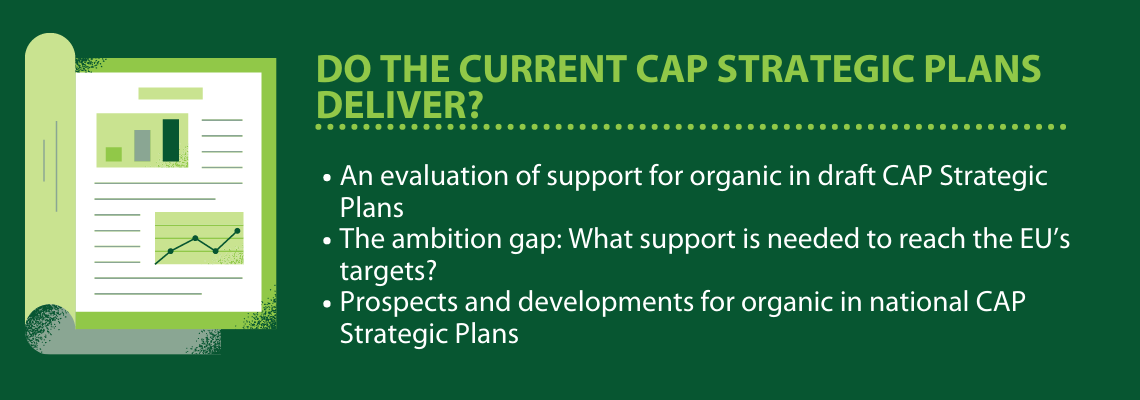Political hotspot May 2022 Newsletter
As of 17 May 2022, the European Commission sent 24 observation letters to Member States on their CAP Strategic Plans, to which Member States provided their feedback. We expect the Commission to send the remaining letters by 10 June 2022.
Key points to address on lack of organic farming support
The European organic movement welcomes the Commission’s relevant observations on the lack of ambition to support organic farming in several countries. Indeed, the Commission identified the relatively low organic farmland targets set in the Netherlands (3.85% by 2027), Denmark (22.6% by 2030 whereas 25% could be reachable) or Ireland (7.5% by 2027). Besides, the Commission also pointed at insufficient budgets to properly boost organic farming in several countries. This includes France, where withdrawal of the budget to support maintenance of organic farming could lead to deconversions as of 2023, and the Netherlands, which set no specific organic scheme. In Finland, Croatia, and Cyprus the budget for conversion is equal to the one for maintenance although farmers in conversion face more challenges and needs to change their practices.
Some organic farmland targets were identified as satisfying by the Commission but IFOAM Organics Europe believes that these countries have the potential to do more. This is the case for Austria, that set a 30% target by 2027 but 40% by 2030 would have been more in line with the 25% organic target average in the EU. In Portugal, despite the share of organic farmland already reaching 18% in 2021, the country set a 19% target 2027.
Some countries also lack budget to reach their target. In Spain, the budget allocated for organic farming for the entire CAP period 2023-2027 is €752 million which is not even enough to maintain the current organic area. To reach a potential target of 25% by 2030 (the Spanish government set a target of 20% by 2030) it would need €1,100 million per year to support the organic area.
Concerns also remain for the organic movement in several countries where organic farmers do not benefit from a clear comparative advantage or have seen their advantage decreased. Not all CAP Strategic Plans properly remunerate organic farmers for the benefits their practices have on the environment and biodiversity compared to other types of farming. For instance, in Austria the organic measure will be combined with a biodiversity measure (UBB) and organic farmers will have additional requirements than the EU Organic Regulation to fulfil. Basic payments per hectare will be reduced for organic grassland (€225 to €215) and organic arable land (€230 to €205) compared to the previous CAP period, whereas the basic payment to meet UBB for conventional farming will increase (from €45 to €70).

Organic movement warns against misused interpretation of overlapping payments
This perceived ‘double funding’ allegedly occurs in several countries including Spain, France, Austria, Germany, Finland and Ireland. It is crucial that the calculation methods used by Member States enable organic farmers to combine their organic schemes with other measures such as eco-schemes, agri-environmental and climate measures (AECMs) and rural development measures (RDM) and do not suffer from a reduction of payments. In Germany, the perceived double funding issue between Eco-schemes and RDM means that farmers taking part in eco-scheme extension of grassland will face €50 deductions in RDM (eco premium payments). In Ireland, where organic farmers choose the conservation of specific farmland birds (to meet relevant objectives set under the Nature Directives) farmers must forgo their organic payment on that farmland even though it is not a requirement of the EU organic regulation.
Will the Member States review their copy?
In Member States’ feedback to the Commission’s Observation Letters, it is worrying to read that some are reluctant to apply the Commission’s observations and upgrade their final draft CAP Strategy Plan. The European organic movement encourages the Commission to continue the discussion with Member States to ensure that plans are reviewed. In the Civil Dialogue Group on the CAP taking place on 13 May, the Commission, represented by director of DG AGRI Wolfgang Burtscher, reiterated its wish to approve all plans by summer to ensure farmers can properly plan their activity for 2023 when the new CAP Strategic Plan Regulation will enter in force as of 1 January 2023. He also insisted that many Member Sates should first provide a more convincing “narrative” on how their CAP measures will contribute to the EU Green Deal.
An internal assessment of the Commission’s Observation Letters is available for our members on the extranet.
For more information on the CAP and IFOAM Organics Europe’s work on this issue, please contact [email protected]. IFOAM Organics Europe members can find more information on the member extranet and background materials in the arguments database on the member extranet (main messages, FAQs, visuals & videos). Contact [email protected] for access rights (issues).
For information about what you can gain from being a member, read our membership page and contact [email protected].

